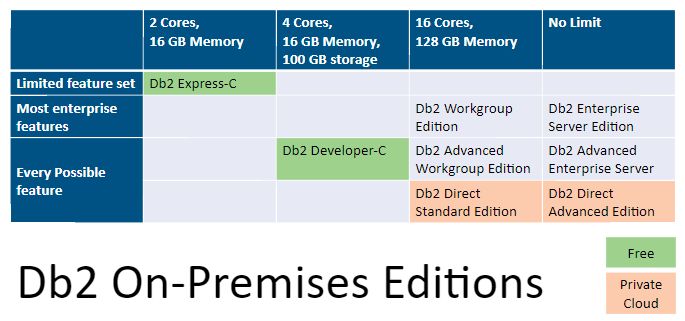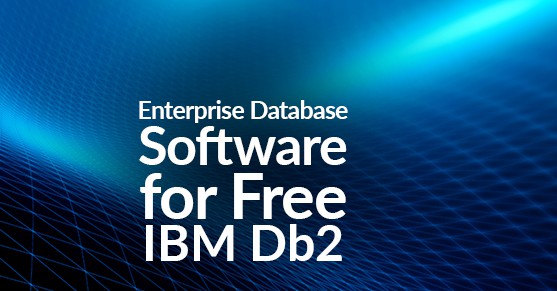Personally, I am biased. As the team lead for Db2 services here at XTIVIA, I think Db2 and other enterprise database software have significant advantages over some of the open source or free options out there. Decades of time invested and spent solving the problems of the largest enterprises can have great benefits, even for small implementations.
I have been surprised several times in recent weeks when I mentioned to someone the free versions of Db2 available and they expressed surprise that there was anything free available from Big Blue (IBM).
Why should you consider starting with one of these free options as opposed to the open-source RDBMS options? The number one reason is scalability. You can start a project on a free version of Db2 and then as you need to scale up, you can move to the various paid options relatively painlessly. These options are also excellent for learners and companies looking to build Db2 expertise in-house.
All versions and licenses of Db2 work on virtual machines. This article covers Db2 for Linux, UNIX, or Windows.
Options for Free
Try and Buy
Try and Buy is IBM’s free trial license. Any edition of Db2 can be tried for 90 days for free. 90 days is often nothing for big, complex products, but it is so easy to just download the latest fix pack of Db2 and install right from there and have 90 days to consider and acquire licensing. If you do not apply a real license file, then Db2 will literally stop working when the trial period is up. No cheating! If you need more time for a POC, talk to IBM or one of XTIVIA’s IBM licensing experts about a POC or what more you need to really see if Db2 is right for you – for potentially large customers, particularly those moving from other RDBMS platforms, IBM will occasionally make an exception.
Db2 Express-C
Db2 Express-C includes most of the excellent functionality of enterprise-class Db2 (with a few exceptions) for small production servers with no support for free. The limits change with some releases, so be sure to look up the current one on an IBM Knowledge Center page like this one. The current limits for Db2 11.1 as of this writing are 2 Cores and 16 GB of memory. That is not a lot in the world of enterprise databases, but for smaller environments, it works just fine. Amazingly, you can also distribute Express-C with your own software solutions for free.
There are some features that are not included with Express-C. The most notable restrictions are:
- No ability to download older code versions – make sure you keep a copy of the software to be able to create identical environments
- Limited fix pack releases – there may not be an Express-C for each fix pack IBM releases, which could be frustrating when you are looking for a specific fix or security patch.
- “Community Support” – meaning no ability to call IBM and ask questions or for patches. The only support you have is what you can find or hire.
- No add-on offerings can be used with Express-C
- An IBM Knowledge Center Page defines exactly which features are or are not available in Express-C. Several technical aspects of other editions of Db2 are not available in Express-C, including:
- Access Plan reuse (Package Cache)
- Data or Index Compression
- Connection Concentration
- Data Server Manager (Base or Enterprise)
- Db2 BLU
- HADR or any kind of replication
- Advanced access control schemes like LBAC or RCAC
- Materialized Query Tables
- Multi-Dimensional Clustering
- Online Reorganization
- Any kind of partitioning (DPF, PureScale)
- Intra-Partition Query Parallelism
- A few surprisingly advanced features are included in Express-C:
- Federation with other IBM midrange data sources
- Native encryption of data at rest
- Oracle compatibility
- Time-Travel Query
Db2 Developer-C
Db2 Developer-C was only announced recently. It is a 100% completely fully featured version of Db2 that can be used in non-production environments only. It is an excellent choice for any development databases that are not full production-scale in size. All of the partitioning features and even BLU can be used with it. This is an exciting cost-saver for organizations and an excellent option for DBAs learning Db2.
The current limits for Developer-C are 4 cores, 16 GB of memory and 100 GB of storage. These limits are pretty generous, but they do essentially eliminate BLU as a workable option. The recommended minimums for both cores and memory are higher than these limits, and 100 GB would be tiny for a BLU database. The limits are per-server, and you can use partitioning features like DPF or PureScale. Unlike Express-C, you can use Developer-C for any fix pack of Db2 to match your production environments. I really can’t say enough good things about this edition.
Like Express-C, Developer-C only comes with community support, so there is no calling IBM for help or fixes.
Developer-C also offers a Docker distribution, making it an easy choice to use with all scales of developer environments.
Free Db2 on Cloud
While there isn’t much Db2 for free on IBM’s cloud, you can get a 7-day free trial of Db2 on Cloud. If you sign up for Db2 Warehouse on Cloud (providing a credit card for the $50/month plan) and use less than 1 GB of storage space, then it is actually free.
Amazon RDS does not provide an RDS option for Db2, but you can use Express-C or any other Db2 license on an EC2 instance. This is true of Db2 on any server-oriented cloud offering – you can use Express-C, Developer-C, or Try-and-Buy for free in those environments.
Other Db2 Licensing Options
Once you outgrow the free tier, there are several good options for Db2 licensing. Some of the most popular are represented in this image:

Beyond the free editions, Db2 is typically licensed based on Processor Value Units (PVUs). Learn more about calculating PVUs from Ember Crooks’ blog entry on calculating PVUs. Servers with a very limited set of users may also be licensed by named users, but this doesn’t work well for more widespread applications. There is a terabyte licensing model that may make sense for some analytics environments. IBM Support is included with Db2 licenses, and the required yearly license fee also includes full IBM Support.
IBM offers a nice edition called Db2 Direct where you don’t have to know the power of the processors you’re running on that is perfect for public or private cloud environments. Db2 direct is also billed monthly, which may make the costs easier to get approved in some corporate environments.
The important approach when choosing an edition is to first have in mind what features you need, what features you want, and what size of system you’re looking at. Most talented Db2 experts, including XTIVIA’s Db2 team, can ask questions and help you determine what edition of Db2 is right for you. Some software resellers may sell you the most features you can afford, whether you need them or not.
Disclaimer
Please verify with IBM any of the statements in this article before relying on them. Licensing options vary by geography, and change from time to time. The statements in this article are true to the best of the author’s knowledge at the time it was written.

